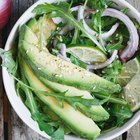Solutions to Minimize Loss of Muscle While Juice Fasting
Juice fasting is a short-term detoxification strategy that involves consuming only fresh fruit and/or vegetable juices. Solid foods, especially those derived from animals and grains, are avoided while juice fasting. The advantages of juice fasting are not well established by scientific research, although many anecdotal reports claim a wide variety of health benefits. In order to minimize loss of muscle mass while juice fasting, you should include fruits and vegetables rich in amino acids or consider adding protein powders. Exercising your muscles while fasting is also a good idea. Consult with your doctor before embarking on any type of radical dietary change.
Juice Fasting
Juice fasting is considered a relatively safe and natural way to detoxify your body, boost immunity and lose weight, according to the “Textbook of Nutritional Medicine. Most juice fasts last for about three days, although it is not uncommon for them to last up to a week. Consuming between eight and 10 medium-sized glasses of juice each day is typical of most juice fasts. However, most fruits and vegetables are poor sources of protein, so extended periods of juice fasting may initiate muscle wasting, which is the atrophy of muscle fibers.
Muscles and Protein

Is Plum Juice Safe to Drink While Pregnant?
Learn More
Muscle tissue is made from protein, which in turn is made from long chains of amino acids. In order to build, maintain or repair muscle tissue, dietary amino acids are required.
Recommendations
Fruits and vegetables commonly used for juice fasting include:
- papaya
- coconut
- kiwi fruit
- peaches
- tomato
- spinach
- asparagus
- broccoli
- alfalfa
- wheatgrass juice
And don’t forget to do some resistance exercises while you’re juice fasting, such as light weightlifting or swimming, which should at least maintain your muscle mass.
Cautions

What Vegetables Don't Cause Gas While Breastfeeding?
Learn More
Too much juice can cause severe gastrointestinal symptoms, such as abdominal bloating, flatulence and diarrhea, so consider drinking more water during the day instead. Further, your body needs some fat, cholesterol and vitamins that are not found in fruit and vegetable juices, so consult with your doctor if you plan on fasting for more than a week.
Related Articles
- Textbook of Nutritional Medicine; Melvyn Werbach and Jeffrey Moss
- Nutritional Sciences for Human Health; Stanislas Berger et al.
- Superfoods: The Healthiest Foods on the Planet; Tonia Reinhard











